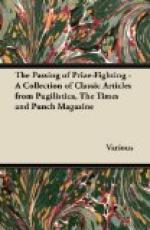How strange a spectacle of human passions
Is yours all day beside the
Arras road,
What mournful men concerned about their
rations
When here at eve the limbers
leave their load,
What twilight blasphemy, what horses’
feet
Entangled with
the meat,
What sudden hush when that machine-gun
sweeps,
And—flat as possible
for men so round—
The Quartermasters may be seen in heaps,
While you sit still and chuckle,
I’ll be bound!
Here all men halt awhile and tell their
rumours;
Here the young runners come
to cull your tales,
How Generals talked with you, in splendid
humours,
And how the Worcestershires
have gone to Wales;
Up yonder trench each lineward regiment
swings,
Saying some shocking
things;
And here at dark sad diggers stand in
hordes
Waiting the late elusive Engineer,
While glowing pipes illume yon notice-boards,
That say, “No LIGHTS.
YOU MUST NOT LOITER HERE.”
And you sit ruminant and take no action,
But daylong watch the aeroplanes
at play,
Or contemplate with secret satisfaction
Your fellow-men proceeding
towards the fray;
Your sole solicitude when men report
There is a shovel
short,
Or, numbering jealously your rusty store,
Some mouldering rocket, some
wet bomb you miss
That was reserved for some ensuing war,
But on no grounds to be employed
in this.
For Colonels flatter you, most firm of
warders,
For sandbags suppliant, and
do no good,
And high Staff officers and priests in
orders
In vain beleaguer you for
bits of wood,
While I, who have nor signature nor chit,
But badly want
a bit,
I only talk to you of these high themes,
Nor stoop to join the sycophantic
choir,
Seeing (I trust) my wicked batman, Jeames,
Has meanwhile pinched enough
to light my fire.
A.P.H.
* * * * *
[Illustration: Lady (looking out of train on to darkened platform). “PORTER, IS THIS EDGWARE ROAD? I CAN’T SEE A THING.”
Porter (with Irish blood in her). “NOT YET, M’M. EDGWARE ROAD’S THE STATION BEFORE YOU GETS TO BAKER STHEET.”]
* * * * *
OUR BOOKING-OFFICE.
(BY MR. PUNCH’S STAFF OF LEARNED CLERKS.)
“In a few days,” says the puff preliminary of The Coming (CHATTO AND WINDUS), “you and all your friends will be reading and discussing this most strange and prophetic novel.” Perhaps. But what we shall be saying about it depends largely, I suppose, upon our definition of the term prophetic; also a little upon our feeling with regard to good taste and the permissible in fiction. My own contribution will be a sincere regret that a writer as gifted as Mr. J.C. SNAITH should have attempted the obviously impossible. His theme,




